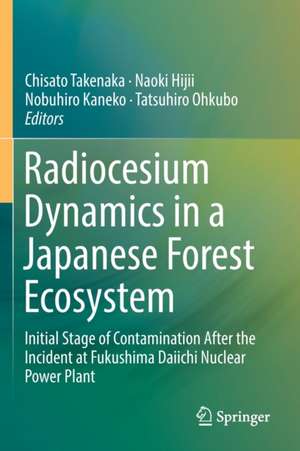Radiocesium Dynamics in a Japanese Forest Ecosystem: Initial Stage of Contamination After the Incident at Fukushima Daiichi Nuclear Power Plant
Editat de Chisato Takenaka, Naoki Hijii, Nobuhiro Kaneko, Tatsuhiro Ohkuboen Limba Engleză Paperback – 3 sep 2020
This book investigates radiocesium movement in all major components of forest ecosystems, e.g. the plants, animals, insects, microorganisms, and soils, during the initial stage of contamination after the incident at Fukushima Daiichi Nuclear Power Plant. Most of the work was conducted at a common research site.
More specifically, the book examines the contribution of surface uptake by trees in the dynamics of radiocesium during the initial contamination stage; the movement of radiocesium in the form of small organic fragments that are essential to the radiocesium dynamics in forest ecosystems; and the upward movement of radiocesium due to microorganism activity, which promotes the effective decontamination of the forest floor. Lastly, it explains why spiders could be a valuable indicator of the contamination level in forest ecosystems.
| Toate formatele și edițiile | Preț | Express |
|---|---|---|
| Paperback (1) | 942.01 lei 43-57 zile | |
| Springer Nature Singapore – 3 sep 2020 | 942.01 lei 43-57 zile | |
| Hardback (1) | 947.98 lei 43-57 zile | |
| Springer Nature Singapore – 3 sep 2019 | 947.98 lei 43-57 zile |
Preț: 942.01 lei
Preț vechi: 1148.78 lei
-18% Nou
Puncte Express: 1413
Preț estimativ în valută:
180.31€ • 195.92$ • 151.56£
180.31€ • 195.92$ • 151.56£
Carte tipărită la comandă
Livrare economică 21 aprilie-05 mai
Preluare comenzi: 021 569.72.76
Specificații
ISBN-13: 9789811386084
ISBN-10: 9811386080
Pagini: 234
Ilustrații: VIII, 234 p. 65 illus., 31 illus. in color.
Dimensiuni: 155 x 235 mm
Greutate: 0.35 kg
Ediția:1st ed. 2019
Editura: Springer Nature Singapore
Colecția Springer
Locul publicării:Singapore, Singapore
ISBN-10: 9811386080
Pagini: 234
Ilustrații: VIII, 234 p. 65 illus., 31 illus. in color.
Dimensiuni: 155 x 235 mm
Greutate: 0.35 kg
Ediția:1st ed. 2019
Editura: Springer Nature Singapore
Colecția Springer
Locul publicării:Singapore, Singapore
Cuprins
Part I: Radiocesium deposition at the accident.- Chapter 1: Radioactive contamination in forest by the accident of Fukushima Daiichi Nuclear Power Plant - Comparison with Chernobyl-.- Chapter 2: Radiocesium deposition at the accident and the succeeding movement through hydrological process in forest ecosystem in Fukushima.- Part II: Mechanisms of radiocesium translocation in plants.- Chapter 3: Uptake of radiocesium by plants.- Chapter 4: Surface absorption of 137Cs through tree bark.- Chapter 5: Translocation of 137Cs in the woody parts of Sugi (Cryptomeria japonica).- Chapter 6: Radiocesium translocations in bamboos.- Chapter 7: Movement of cesium in model plants.- Part III: Radiocesium movement through ecological processes in forest ecosystem.- Chapter 8: Movement of radiocesium as litterfall in deciduous forests.- Chapter 9: Changes in chemical forms of radiocesium in the forest floor organic matter with decomposition, and uptake of radiocesium derived from the organic matter by crops.- Chapter 10: Contamination and transfer of radio-Cs in soil ecosystem.- Chapter 11: Spiders as an indicator of 137Cs dynamics in the food chains in forests.- Chapter 12: Radioactive cesium contamination of sika deer in Oku-Nikko region of Tochigi Prefecture in Central Japan.- Part IV: Radiocesium dynamics and its perspective in forests.- Chapter 13: Modeling radiocesium dynamics in a contaminated forest in Japan.- Chapter 14: Future perspective.
Notă biografică
Chisato Takenaka
Graduate School of Bioagricultural Sciences, Nagoya University
Aichi, Japan
Naoki Hijii
Graduate School of Bioagricultural Sciences, Nagoya University
Aichi, Japan
Nobuhiro Kaneko
Faculty of Food Agricultural Sciences, Fukushima University
Fukushima, Japan
Tatsuhiro Ohkubo
Faculty of Agriculture, Utsunomiya University
Tochigi, Japan
Textul de pe ultima copertă
This book investigates radiocesium movement in all major components of forest ecosystems, e.g. the plants, animals, insects, microorganisms, and soils, during the initial stage of contamination after the incident at Fukushima Daiichi Nuclear Power Plant. Most of the work was conducted at a common research site.
More specifically, the book examines the contribution of surface uptake by trees in the dynamics of radiocesium during the initial contamination stage; the movement of radiocesium in the form of small organic fragments that are essential to the radiocesium dynamics in forest ecosystems; and the upward movement of radiocesium due to microorganism activity, which promotes the effective decontamination of the forest floor. Lastly, it explains why spiders could be a valuable indicator of the contamination level in forest ecosystems.
Caracteristici
Describes movements of radiocesium among various components in forest ecosystems Provides practical, useful information for designing decontamination plans Focuses on forests that residents frequently use
